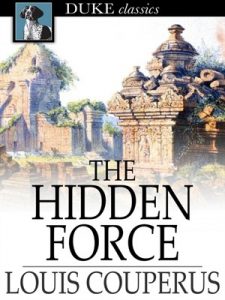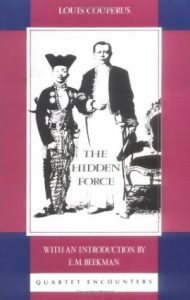The Hidden Force – Louis Couperus – 1900

Posted by Chris on 14/12/2001, 21:44:29
I have wanted to read The Hidden Force for several years because the town in which much of the story was set, Pasuruan (called Lambuwangi in the novel) is a place that I lived for a short time, and I thought it would be fascinating to see a glimpse of this same town 100 years ago. After reading the book, however, I can say that I have no real idea what the town was like, and in that sense was disappointed. But! and what a big but, what I discovered was a novel of intricate style, subtle insight, and a plot so “supernaturally realistic” that it could have only happened in Java.
One of the things I enjoyed about the book was the way Couperus decribed Java in such a way that the supernatural events seemed as though they could really occur. This has been attempted in many other novels, but with few exceptions (100 years of Solitude, and Midnight’s Children come to mind) has largely failed. I loved his imagery of the native servants passing knowing looks among themselves, as if they knew that the Europeans’ harsh logic and disbelief of anything but that which they could see; I liked the contrast between the skepticism of Van Oudijk and the wry acceptance of all possibility by Leonie’s made Urip; but most particularly I liked the portrayal of there being an unseen, animate force that lurks everywhere as a foil to the arrogant colonials who revelled in their supposed omnipotence.
The Javanese in the novel seemed to carry themselves with a sense of resigned submission, but simultaneously understanding (because of their openness to other, non-physical forces) a kind of advantage they held vis-a-vis the Dutch. I was reminded of a story I was told while living in Indonesia. It seems that the colonial administrators were great lovers of staged fights between animals, and the Javanese would have contests pitting tigers against water buffaloes. Now, water buffaloes are so intimately involved with Javanese culture that they are a sort of symbol of that culture (kind of like a bald eagle is to Americans). In these fights, the tiger would always leap at the buffalo’s neck and attempt to bite through, but could not do so because of the tough skin. With the tiger on its neck, the buffalo (who have long horns that curve back from its head) would swing its head from side to side, goring and killing the tiger. To the Javanese, this was a subtle victory over their colonial overlords (who it was easy to equate with the powerful tiger), and most importantly a victory over an enemy who wasn’t aware that it had been defeated. Couperus does a wonderful job at reflecting that same attitude of submission and yet quiet victory by the Javanese.
Couperus’ style was an interesting paradox to me. One one hand he writes in a very flowery, minutely descriptive style, and at the same time is not verbose; an unusual combination. This combination of floridness and economy was something I have not seen.
The character development I thought to be a bit lacking. Obviously the novel was something of an allegory for the inevitable demise of the colonial regime and the attitudes which would lead to that demise, and in such a novel the characters tend to be little more than archetypes. But I found the foppish playboy Addy, the hopelessly loving Doddy, and both regents of Lambuwangi and Nagadjiwa to be rather two-dimensional. I liked Van Oudijk; to me he seemed very real. He maintained a stubborn insistence of belief whereby he always saw the world as he wanted to see it, yet emotionally collapsed once that illusion was shattered. I think everyone does that to a degree.
The plot itself seemed a bit quotidian, and I think that it must have been secondary in importance to the portrayal of the colonial shortcomings, the racial stratification of colonial society, and of course the ethereal nature of Java itself. That is, until the plot converged with that mysticism, and it was revealed that that very “hidden force” was what would drive out the Dutch (as it did Van Oudijk. And as I though about it, I supposed that the Javanese knowledge of that “force” and their feeling of superiority over the Europeans really did influence the demise of the colony. The natives never completely let themselves feel inferior, and in doing so were able to later succeed in independence.
In some ways the novel may seem a bit cliche with its depiction of Western practicalism and Eastern mysticism. But as anyone who has spent time in Java will tell you, there does seem to be that sort of feel about the place. The Javanese refer to it as the worlds of “lahir” and “batin.” Lahir is the physical world. Batin is a coterminous, non-physical world which exists side by side to the physical, and actions in either world have impacts in the other. When everyone around you is so matter-of-fact about its existence (as they were during my time and as I’m sure they were during Couperus’ time), it becomes very easy to accept the existence of events and forces that you cannot see.
A note on spelling: The book I have employed the old Dutch transliterated spelling of Malay and Javanese words. This system has been updated to reflect more accurate pronunciations. For example, the “tj” is now “c” and pronounced ch and in “change” (Patjaram is now Pacaram). Similarly, “dj” is now “j” and pronounced as a hard “j.”
Overall I liked it and would give it 3 1/2 stars our of five. It wasn’t what I expected, but was much more complex and rewarding.

Posted by Lale on 17/12/2001, 11:09:20
I wonder what the Dutch word for indifferent is? I wonder which word Louis Couperus used to explain Leonie?
I enjoyed this book tremendously. It is the first time I am reading a book in such a setting. I had a great time imagining the squatting oppassers and the rocking chairs in the verandas.
Most people in the book didn’t know who they were. They obsessed about their own racial blend and chose one side over the other. Some were entirely of European descent but born and raised in the Indies and never set foot to Europe. Some, had only a spoonful of Indies in their blood and yet associated with the Indies more. Or the other way round. Identity was a confusing matter.
The surreal aspect of the book was very very interesting. The impact on a man like Van Oudijk was disastrous.
I found Eva a very realistic personage and the most likeable one in the book. In the end it is she who makes us understand and sympathize with Van Oudijk. I tried to put myself in Eva’s place and wonder how I would have dealt with the situation.
Posted by Anna van Gelderen on 18/12/2001, 10:58:08
I definitely enjoyed rereading this book, which I read (in Dutch naturally) while I was still at grammar school. I had forgotten practically all of it and at the time was too young to get much out of it, I’m sure. I did some background reading now and found that as a child Couperus spent several years in “Indië” (as the Dutch call it) and came completely under its spell. This explains a lot. Children are much more susceptible to and accepting of the irrational. Couperus made it the main character of his novel, which incidentally is called “The Silent Force” in the original – a subtle difference. To the child Couperus this mystery was something he relished, to the characters in his book it is a menace or worse: a force they are ultimately unable to cope with and that leads to their downfall.
The novel is for the most part not so much a coherent story with carefully drawn characters, as the painting of an atmosphere, a mood. The characters either fit in with this or they don’t. Those that don’t are the ones that are in the country as colonizers. The spirit of the country (the hidden force) won’t take them in, because they are there for the wrong reasons. Even Eva, who is determined to love the country, can’t cope. Her mistake is that she tries to transplant The Hague’s cultural life to a backwater in Java. Eva and Van Oudijk are the characters I sympathized with most. There intentions were good, but their reasons all wrong.
I was rather surprised that even half a century before the end of colonialism in Indonesia Couperus was already so outspokenly opposed to it. I have not been able to find out what the reception of this novel was like in 1900, but I do know that while he was alive his books were not a great success.
The flowery style (which was in vogue at the time) did not work for me. It did nothing to recreate the landscape and the atmosphere. Fortunately his conversations are very good, especially if you know the lovely accent of the people who had spent their entire life in Indië. I could actually hear Doddie talk. Of course this does not come across in translation.
Posted by Lale on 18/12/2001, 14:11:32
The copy I have is translated by Alexander Teixeira de Mattos and has an introduction by E.M. Beekman. I found the translation smooth (“indifference” notwithstanding), and the introduction, the notes at the end, and the glossary very helpful.
A quote from the introduction:
“I thought that Holland was terrible. I believe that every Indies child that comes to Holland must experience the same thing. The smaller house, the hole of a garden, no carriages and no horses … two maids and a man-servant instead of thirty servants: I thought it was terrible, didn’t understand it, thought that my parents had been ruined, and didn’t want to believe that this was not true at all. …”
It is quoted from Couperus’ collected works: Louis Couperus, Verzameld Werk, 12 vols (7:673).
That must be part of the reason why so many people volunteered to leave their homeland to go to the Indies. Cheap labour, luxurious life, large houses and a lot of maids. Then of course they got all disillusioned. The climate, the social life, the work, everything is different.
There is a reason why the locals dress the way they do. They know something about the environment and the climate. It is ridiculous to wear stiff, layer-on-layer European clothes in Java, as Eva found out.
The colonizers were there to look down upon the locals. After all, the locals didn’t know anything, they couldn’t even make use of their own resources, they didn’t have the power, the know-how. They were simply savages. The colonizer felt imminently superior.
Such a terrible and irreversible thing, colonization. Such a stain on humanity.
















